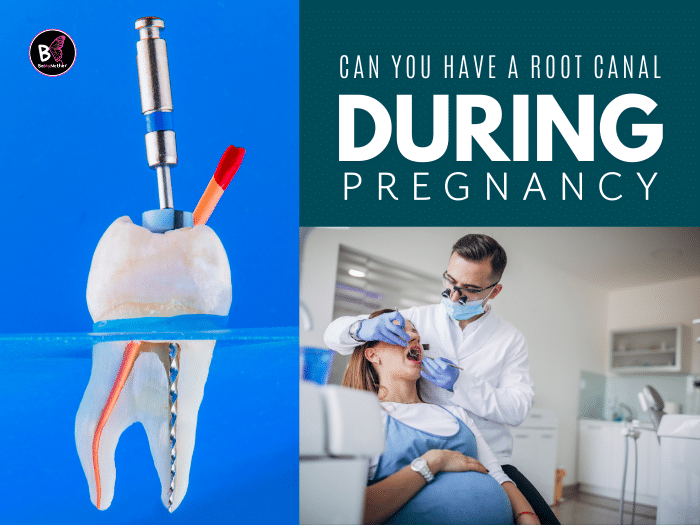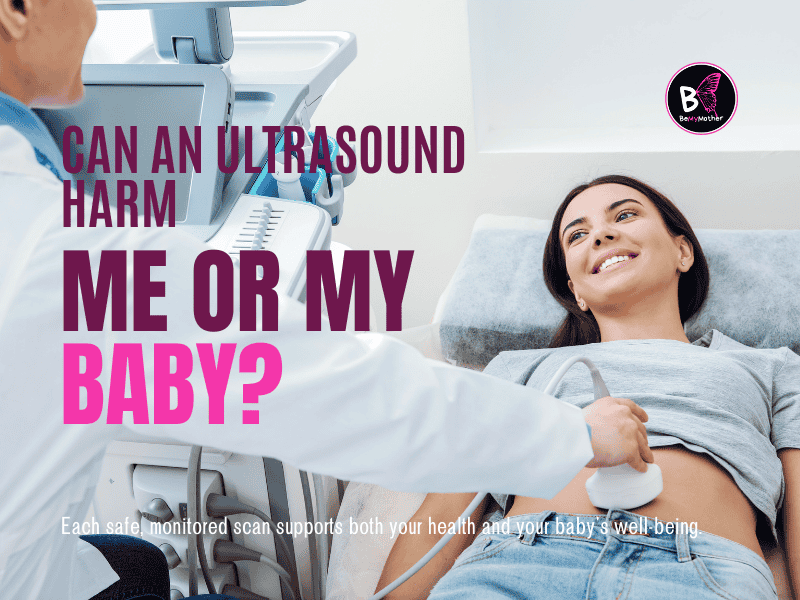Pregnancy is an exciting journey, but it comes with extra care for your health—including your dental health. Toothaches and infections can happen anytime, and you may wonder, “Can you have a root canal during pregnancy?” The good news is that root canals are safe and often necessary to protect your health and your baby’s well-being. This guide explores everything you need to know about timing, safety, and alternatives to ensure you make the best decision for your dental care during pregnancy.
1. Can You Have a Root Canal During Pregnancy?
Yes, you can safely have a root canal during pregnancy. This procedure is often necessary to treat dental infections that could harm you and your baby if left untreated. A root canal removes infected tissue inside the tooth, relieving pain and preventing the spread of infection. Ignoring a dental infection may lead to more severe complications, such as abscesses, which can impact maternal and fetal health.
🔍 Research Insight: The American Dental Association (ADA) affirms preventive, diagnostic, and restorative dental treatment, including root canals, is safe throughout pregnancy. They emphasize the importance of treating dental infections promptly to prevent complications.
Source: American Dental Association (ADA)
2. When Is It Safe to Get a Root Canal During Pregnancy?
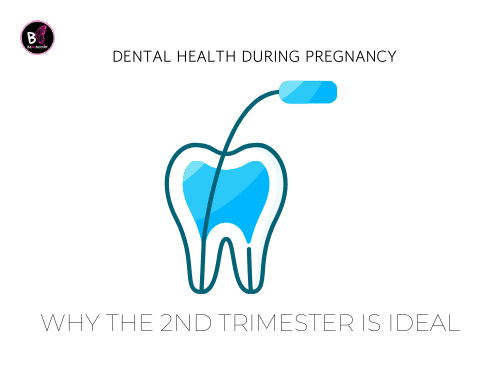
The best time for most dental procedures, including root canals, is during the second trimester (13–26 weeks). Here’s why:
- During the first trimester, the baby’s organs are developing, and avoiding non-urgent procedures is best.
- By the third trimester, lying back for extended periods can be uncomfortable, and there’s a higher risk of preterm labor.
A root canal may be performed at any stage for emergencies, but the second trimester is generally the safest and most comfortable window.
💡 Related Article: Concerned about dental health during pregnancy? Learn about safe and effective ways to manage oral care in Can You Get a Tooth Pulled During Pregnancy? 9 Essential Facts for a Safer, Healthier Pregnancy to Protect You and your baby.
3. The Role of Anesthesia and Medications During Pregnancy
Local anesthesia and medications are often necessary during root canals, but they are safe for pregnant women when used appropriately.
- Local Anesthetics: Dentists typically use lidocaine or similar medications with epinephrine to minimize discomfort while keeping doses safe for the baby.
- Antibiotics: If an infection is present, antibiotics like amoxicillin or clindamycin are commonly prescribed, as they are considered safe during pregnancy.
🔍 Research Insight: Local anesthetics with epinephrine, such as bupivacaine, lidocaine, and mepivacaine, are considered safe during pregnancy when used appropriately. The ADA and the American College of Obstetricians and Gynecologists (ACOG) support this recommendation.
Source: American Dental Association (ADA)
4. Can Dental X-Rays Be Done Safely While Pregnant?
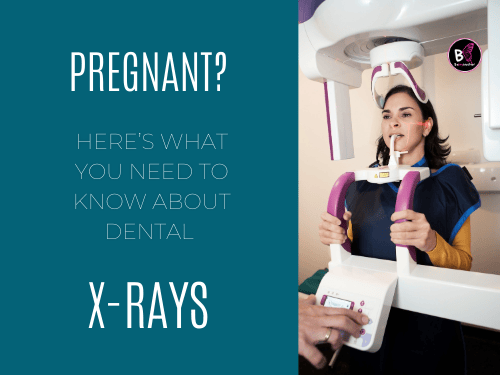
Yes, dental x-rays are safe during pregnancy when protective measures are in place. Dentists use lead aprons to shield your abdomen and thyroid from radiation. Modern x-rays produce minimal radiation, making the procedure low-risk.
Root Canal Treatment and Pregnancy | Dr. Jaydev Dental Clinic, Hyderabad
Common Myths About Dental X-Rays:
- Myth: X-rays harm the baby.
- Fact: When proper shielding is used, the radiation exposure is negligible.
🔍 Research Insight: Dental X-rays are considered safe during pregnancy, especially when protective measures like lead aprons are used to shield the abdomen and thyroid. According to the Mayo Clinic, the potential risks of dental X-rays during pregnancy are minimal, and the benefits often outweigh the risks.
Source: Mayo Clinic
5. What Happens if You Delay a Root Canal While Pregnant?
Delaying a root canal can have serious consequences:
- Tooth Abscesses: An untreated infection can worsen, leading to abscesses or swelling.
- Systemic Infections: Severe infections can spread to other parts of the body, increasing risks for both mother and baby.
- Increased Pain: Delaying treatment may cause the condition to progress, leading to heightened discomfort.
In some cases, waiting can be more harmful than proceeding with a carefully planned root canal.
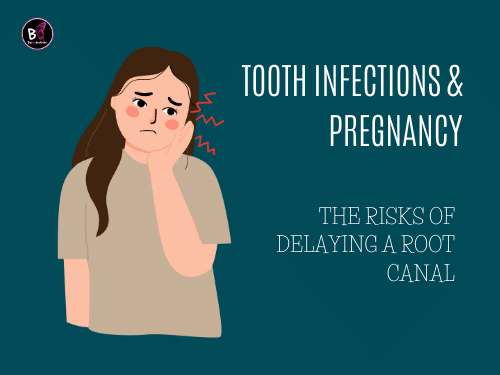
💡 Related Article: Worried about managing pain relief during pregnancy? Discover key safety guidelines and expert tips in Can I Take Excedrin During Pregnancy? 11 Key Points to Decide If It’s Safe for You to make informed decisions about your health.
6. Common Oral Health Issues During Pregnancy and How They Impact Dental Procedures
Pregnancy hormones can increase your risk for specific oral health problems, making dental care even more important:
- Pregnancy Gingivitis: Swollen, bleeding gums are common and can make your gums more sensitive during procedures.
- Cavities: Increased acidity in the mouth and cravings for sugary foods can lead to more cavities.
- Loose Teeth: Hormonal changes can temporarily loosen ligaments and bones supporting teeth.
These conditions may make routine dental check-ups essential to prevent complications and maintain oral health.
7. Alternatives to a Root Canal During Pregnancy
If a root canal isn’t immediately possible, your dentist may suggest temporary solutions:
- Temporary Fillings: These can stabilize the tooth until a root canal can be performed.
- Tooth Extraction: In extreme cases, removing the tooth may be a safer option.
While these alternatives may address the immediate issue, a root canal is often the best solution for saving the tooth and preventing further complications.
💡 Related Article: Ever wondered why your feet feel different during pregnancy? Discover the surprising changes your body undergoes in Do Feet Grow During Pregnancy? 10 Shocking Facts That Bust Common Myths and stay informed about what to expect.
8. Preventing Dental Issues During Pregnancy
Good oral hygiene is your first line of defense against dental problems during pregnancy. Here’s how to keep your teeth healthy:
- Brush and Floss Daily: Use fluoride toothpaste and floss to prevent cavities and gum disease.
- Maintain a Balanced Diet: Eat calcium-rich foods and avoid excessive sugar.
- Schedule Regular Check-Ups: Visit your dentist for routine cleanings and exams.
| Preventive Measure | Why It Matters |
| Brush Twice a Day | Reduces plaque and prevents cavities. |
| Floss Daily | Removes debris between teeth and gums. |
| Dental Check-Ups | Early detection of potential issues. |
FAQ Section: Addressing Common Questions
- Can you have a root canal during pregnancy?
Yes, a root canal can be safely performed during pregnancy, especially in the second trimester. Consult your dentist to ensure proper precautions are taken. - Is dental anesthesia safe during pregnancy?
Local anesthesia is safe when administered by a qualified dentist. They will use the lowest effective dose to ensure comfort while minimizing risks. - What dental procedures should be avoided during pregnancy?
Elective procedures like teeth whitening and non-urgent extractions are best postponed until after delivery. - Can dental x-rays harm my baby?
No, dental x-rays are safe during pregnancy when proper shielding, like a lead apron, is used to protect the abdomen. - What happens if a tooth infection is left untreated during pregnancy?
Untreated infections can lead to serious complications, including the risk of spreading to other areas or impacting the baby’s health. - Which trimester is best for dental treatments?
The second trimester is considered the safest for most dental procedures as the baby’s major organ development is complete, and the mother is more comfortable. - Can a tooth abscess harm an unborn baby?
Yes, a tooth abscess can lead to systemic infections that may pose risks to both mother and baby. Prompt treatment is essential. - Does pregnancy make cavities worse?
Yes, hormonal changes during pregnancy can increase the risk of cavities and gum disease, making regular dental care crucial.
Conclusion
If you’re wondering, “Can you have a root canal during pregnancy?” the answer is Yes—with the right timing and precautions. The second trimester is ideal for most dental treatments, including root canals, ensuring safety and comfort. Treating infections promptly alleviates pain and protects your baby from potential complications. Remember, maintaining good oral hygiene during pregnancy is key to avoiding dental problems. By working closely with your dentist, you can navigate pregnancy with a healthy smile and peace of mind.
💡 Related Article: Curious about post-pregnancy transformations and recovery options? Explore expert-backed insights on reshaping your body safely in Why Is Tummy Tuck Good for Post Pregnancy? 9 Life-Changing Expert-Backed Insights and learn how to navigate the journey after childbirth.

